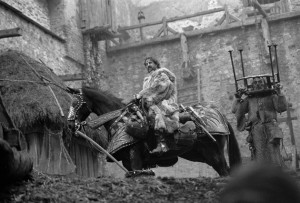 For some reason, film writers have this thing for lists, “best of,” “favorite,” “greatest” and so forth, of the year or the decade or of all time—this is more of a compulsion for them even than music or sports fans. I’m no different. It’s fun to look back, evaluate, and compare movies, as long as I recognize that any list is limited by what I managed to see, and what I was able to see. By any measure, 2015 was an incredibly rich year for film, but how many of the most interesting or innovative pictures made it to the local multiplex? The truth is, a film snob has to be on the lookout. And I’m lucky there’s an art theater in town, and a bunch of festivals too. Here are my four favorite motion picture experiences from last year.
For some reason, film writers have this thing for lists, “best of,” “favorite,” “greatest” and so forth, of the year or the decade or of all time—this is more of a compulsion for them even than music or sports fans. I’m no different. It’s fun to look back, evaluate, and compare movies, as long as I recognize that any list is limited by what I managed to see, and what I was able to see. By any measure, 2015 was an incredibly rich year for film, but how many of the most interesting or innovative pictures made it to the local multiplex? The truth is, a film snob has to be on the lookout. And I’m lucky there’s an art theater in town, and a bunch of festivals too. Here are my four favorite motion picture experiences from last year.
I admit that I tend to favor an epic vision. And if that vision is a steep, relentless assault on the heart and the mind, a mad journey through a world where the human as such suffers the ultimate degradation, I still can’t avoid the sense of awe it inspires. The late Russian director Aleksey German’s final work, Hard to be a God, is such a film. A powerful aristocrat surges and slashes his way through a nightmarish medieval landscape whose denizens survive in an animalistic state of ignorance and fear. And for what purpose is he so favored with his dominant, god-like position? German’s three hour, rain-soaked black-and-white spectacle of hell is about power for its own sake, and it goes further into that fact of history than any film has ever dared. As Hard to be a God unfolds, you may find yourself wondering, “How did they do this?” But keeping in mind what’s going on in the news nowadays, you may also think, “Is this where we’re headed?”
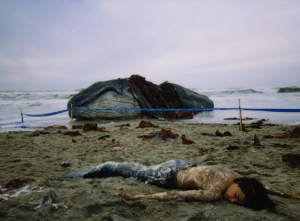 My second choice is a different sort of epic. Portuguese director Miguel Gomes brings us Arabian Nights, a three-part, six-hour excursion into the state of inequality and injustice we all live in after the great crash of ’08, with Portugal and its misguided austerity policies standing in for the rest of the world. Using the structure of the great fable collection The 1001 Nights, Gomes ranges far and wide with stories that mix the real and the symbolic, the everyday and the absurd. And whether it’s with a rooster put on trial for crowing at the wrong hours, or a pet dog whose unflagging happiness contrasts with the misery of a variety of its owners, Gomes uses the mythology of nature and animals to convey that which makes us most human.
My second choice is a different sort of epic. Portuguese director Miguel Gomes brings us Arabian Nights, a three-part, six-hour excursion into the state of inequality and injustice we all live in after the great crash of ’08, with Portugal and its misguided austerity policies standing in for the rest of the world. Using the structure of the great fable collection The 1001 Nights, Gomes ranges far and wide with stories that mix the real and the symbolic, the everyday and the absurd. And whether it’s with a rooster put on trial for crowing at the wrong hours, or a pet dog whose unflagging happiness contrasts with the misery of a variety of its owners, Gomes uses the mythology of nature and animals to convey that which makes us most human.
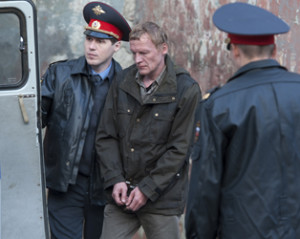 My third choice is another Russian film, Leviathan, directed by Andrey Zvyagintsev. A man named Kolya, living in his family home on the Volga River, fights with the corrupt mayor of his town who plans to demolish his house to make way for a lucrative building project. Enlisting an old lawyer friend to help him in his case, Kolya is so consumed with rage that he doesn’t see the possible threat of a love affair between his friend and his long-suffering wife. Meanwhile, a prominent priest who is allied with the mayor evokes urgent questions concerning faith, the church and state. Vladimir Putin is never mentioned in the film, but what he represents is reflected in almost every scene. Leviathan is a heart-rending tragedy of the collision between the personal and the political.
My third choice is another Russian film, Leviathan, directed by Andrey Zvyagintsev. A man named Kolya, living in his family home on the Volga River, fights with the corrupt mayor of his town who plans to demolish his house to make way for a lucrative building project. Enlisting an old lawyer friend to help him in his case, Kolya is so consumed with rage that he doesn’t see the possible threat of a love affair between his friend and his long-suffering wife. Meanwhile, a prominent priest who is allied with the mayor evokes urgent questions concerning faith, the church and state. Vladimir Putin is never mentioned in the film, but what he represents is reflected in almost every scene. Leviathan is a heart-rending tragedy of the collision between the personal and the political.
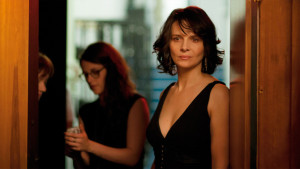 And finally, my fourth choice is by the great French director Olivier Assayas. Clouds of Sils Maria is a poignant, surprising meditation on youth and age, technology, the role of the artist, love, jealousy, mortality, and much more, as reflected in the story of a middle-aged actress played by Juliette Binoche, returning to a play she did when young, but now in a different role, and navigating her fears and desires with the help of her young personal assistant, played by Kristen Stewart. The perfection of imperfection is woven into the director’s aesthetic, never more so than here, in this poetic film of flawed relationships set against distant landscapes. Clouds of Sils Maria ultimately reveals its secrets by respecting life’s mystery.
And finally, my fourth choice is by the great French director Olivier Assayas. Clouds of Sils Maria is a poignant, surprising meditation on youth and age, technology, the role of the artist, love, jealousy, mortality, and much more, as reflected in the story of a middle-aged actress played by Juliette Binoche, returning to a play she did when young, but now in a different role, and navigating her fears and desires with the help of her young personal assistant, played by Kristen Stewart. The perfection of imperfection is woven into the director’s aesthetic, never more so than here, in this poetic film of flawed relationships set against distant landscapes. Clouds of Sils Maria ultimately reveals its secrets by respecting life’s mystery.
And now for the rest of my top 10:
The Look of Silence (Joshua Oppenheimer).
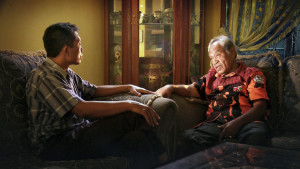 This documentary, a follow-up to Oppenheimer’s The Act of Killing, returns to the horrific stories of the mass murders in Indonesia following the military coup in 1965. The killers are still celebrated there as heroes who defended the country against its enemies. The first film was about the self-perception of the murderers. This one is about the victims, using the story of a man named Adi, whose older brother was among the millions massacred by death squads. With calm dignity, he confronts several of the now elderly killers. Their reactions range from defensiveness to anger. The title of the film may refer Adi’s sad and quiet gaze. It also evokes the denial that permeates Indonesian society.
This documentary, a follow-up to Oppenheimer’s The Act of Killing, returns to the horrific stories of the mass murders in Indonesia following the military coup in 1965. The killers are still celebrated there as heroes who defended the country against its enemies. The first film was about the self-perception of the murderers. This one is about the victims, using the story of a man named Adi, whose older brother was among the millions massacred by death squads. With calm dignity, he confronts several of the now elderly killers. Their reactions range from defensiveness to anger. The title of the film may refer Adi’s sad and quiet gaze. It also evokes the denial that permeates Indonesian society.
The Assassin (Hou Hsiao-Hsien).
 Hou has fulfilled a long ambition in making this movie, which is from a Chinese genre known as wuxia, stories of medieval swordsmen and their warrior code. The warrior here is a woman (Qi Shu) whose mission, based on complex political and familial causes that are only gradually revealed, is to assassinate her cousin, the lord of the province. Hou’s celebrated long takes, coupled with the stunning cinematography of Mark Lee Ping Bin, make this the most visually beautiful and meditative film of the year.
Hou has fulfilled a long ambition in making this movie, which is from a Chinese genre known as wuxia, stories of medieval swordsmen and their warrior code. The warrior here is a woman (Qi Shu) whose mission, based on complex political and familial causes that are only gradually revealed, is to assassinate her cousin, the lord of the province. Hou’s celebrated long takes, coupled with the stunning cinematography of Mark Lee Ping Bin, make this the most visually beautiful and meditative film of the year.
Phoenix (Christian Petzold).
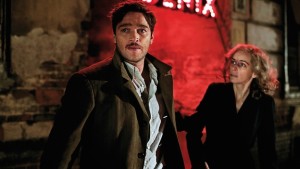 This film employs one of the most melodramatic plot devices imaginable—a woman whose plastic surgery has made her unrecognizable to a husband who believes she is dead, agrees to pretend to be his wife in order to help him gain her inheritance. But Petzold seeks through these means to explore the guilt and especially the denial of Germany after the war. The woman (Nina Hoss, magnificent) is a concentration camp survivor, and the husband may have been the one who betrayed her. The ending, and the film, is devastating.
This film employs one of the most melodramatic plot devices imaginable—a woman whose plastic surgery has made her unrecognizable to a husband who believes she is dead, agrees to pretend to be his wife in order to help him gain her inheritance. But Petzold seeks through these means to explore the guilt and especially the denial of Germany after the war. The woman (Nina Hoss, magnificent) is a concentration camp survivor, and the husband may have been the one who betrayed her. The ending, and the film, is devastating.
Gueros (Alonso Ruizpalacios).
 There’s something very new and refreshing about this tale of three shiftless young men in Mexico City, who venture out into the city in the midst of the huge 1999 University student strike. Their mission is to visit a legendary folk musician who is reported to be close to death in a hospital. Shot in black & white, and in Academy ratio, the picture has a sly sense of humor, the characters making off-hand comments on Mexican film and culture while wandering on the margins of big events.
There’s something very new and refreshing about this tale of three shiftless young men in Mexico City, who venture out into the city in the midst of the huge 1999 University student strike. Their mission is to visit a legendary folk musician who is reported to be close to death in a hospital. Shot in black & white, and in Academy ratio, the picture has a sly sense of humor, the characters making off-hand comments on Mexican film and culture while wandering on the margins of big events.
Carol (Todd Haynes).
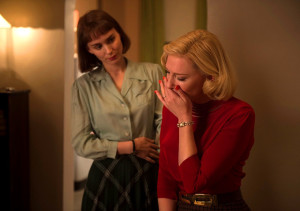 Haynes has mastered the art of using classic Hollywood style to explore themes classic Hollywood wouldn’t touch. The story, from a 1952 Patricia Highsmith novel, concerns an affair between an inexperienced young woman named Therese (Rooney Mara) and the eponymous love object played by Cate Blanchett. The picture is carefully and exquisitely constructed through a series of gestures and conversations that conceals passionate emotion behind futile attempts at propriety. Blanchett and Rooney are completely committed to their roles, and together they create a feeling of insularity, of being alone together, floating in a romantic bubble, a bubble that the world will of course burst.
Haynes has mastered the art of using classic Hollywood style to explore themes classic Hollywood wouldn’t touch. The story, from a 1952 Patricia Highsmith novel, concerns an affair between an inexperienced young woman named Therese (Rooney Mara) and the eponymous love object played by Cate Blanchett. The picture is carefully and exquisitely constructed through a series of gestures and conversations that conceals passionate emotion behind futile attempts at propriety. Blanchett and Rooney are completely committed to their roles, and together they create a feeling of insularity, of being alone together, floating in a romantic bubble, a bubble that the world will of course burst.
Mr. Turner (Mike Leigh).
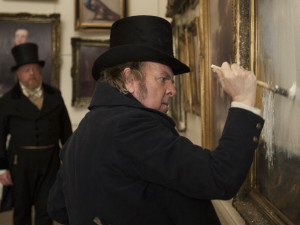 Timothy Spall gives the performance of his career as the great English painter J.M.W. Turner. Not a man of words, Turner is shown stubbornly pushing his way along, all his thoughts devoted to his art, and the rest of his time ruled by inchoate emotional and physical needs. Leigh is out to dissolve the myth of the artist as hero. He knows very well that an artist is a human being, subject to the same flaws and vices as the rest of us, and Turner’s artistic brilliance is presented side-by-side with his thorny temper and his callous treatment of the women in his life. In the end there is an unplumbed mystery to Turner, of which Leigh wisely chooses to give us only glimpses.
Timothy Spall gives the performance of his career as the great English painter J.M.W. Turner. Not a man of words, Turner is shown stubbornly pushing his way along, all his thoughts devoted to his art, and the rest of his time ruled by inchoate emotional and physical needs. Leigh is out to dissolve the myth of the artist as hero. He knows very well that an artist is a human being, subject to the same flaws and vices as the rest of us, and Turner’s artistic brilliance is presented side-by-side with his thorny temper and his callous treatment of the women in his life. In the end there is an unplumbed mystery to Turner, of which Leigh wisely chooses to give us only glimpses.
And now the B-sides:
The Salt of the Earth (Wim Wenders & Juliano Ribeiro Salgado). Intense, beautiful doc about the life and work of the great Brazilian photojournalist Sebastiao Salgado, chock full of his amazing photos.
Results (Andrew Bujalski).
A very smart, witty comedy about a misfit (Kevin Corrigan) whose sudden inheritance creates havoc for a gym owner (Guy Pearce) and personal trainer (Cobie Smulders). Nothing happens like you’d expect.
Victoria (Sebastian Schipp).
A single-take, no-cuts movie that is the real deal. The title character, played wonderfully by Laia Costa, encounters a group of friendly young guys in the wee hours of Berlin. Some bad decisions push the film into thriller territory.
A Pigeon Sat on a Branch Reflecting on Existence (Roy Andersson).
Andersson’s bitterly funny world view is revealed through a series of absurd, stationary set-pieces. Drenched in despair, the picture turns out to have a political message that is not easily dismissed.
Listen to Me Marlon (Stevan Riley).
Riley uses over 300 tape recordings made by Marlon Brando, combined with many film clips, to tell the story of the iconic actor’s life in his own words. Haunting.
Saint Laurent (Bertrand Bonello).
Gaspard Ulliel plays the fashion designer Yves Saint Laurent, and Bonello takes the point of view of an imagined participant rather than an omniscient observer. The film feels both hermetic and intoxicating.
Ex Machina (Alex Garland).
For once, an intellectual science fiction film. A cat-and-mouse game between scientist and protégé over the AI bona fides of a beautiful robot (Alicia Vikander) goes to intriguing lengths.
Jimmy’s Hall (Ken Loach).
The true story of an Irish activist in the 1930s and his efforts, in the teeth of bitter opposition, to establish a village community center. Loach takes the time to believably convey the clash of ideas as well as characters.
Infinitely Polar Bear (Maya Forbes).
A clumsy title for a beautiful film about a bipolar dad (Mark Ruffalo) doing his best to raise two young daughters. Forbes takes her stand on love and a sense of humor rather than despair, and Ruffalo hits it out of the park.
Wild Tales (Damian Szifron).
Six stories involving extreme reactions to stress are combined in this clever and exciting film from Argentina. The finale, with a bride going ballistic at her own wedding when she discovers her groom’s infidelity, is the best.

